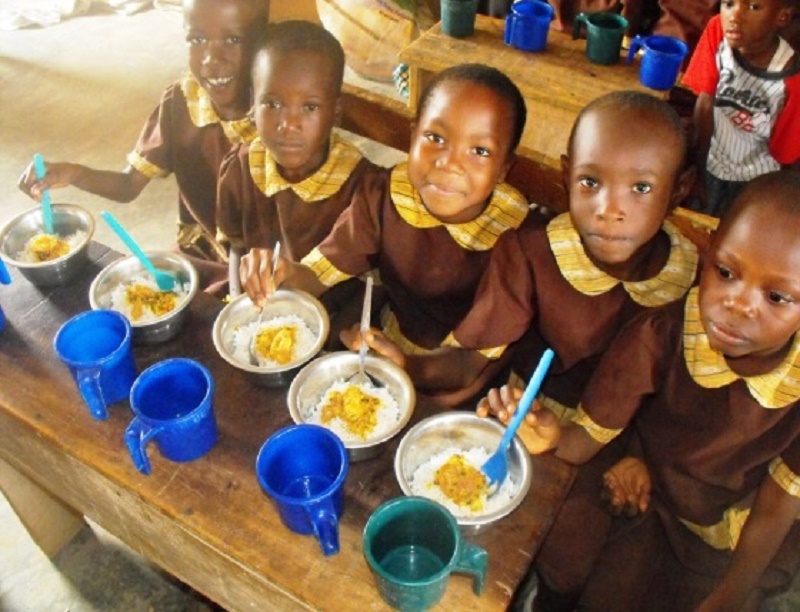Featured
NASCO can feed 25 million school kids daily with HND biscuit — Marketing Consultant
Published
8 years agoon
By
Olu Emmanuel
Many still doubt the MOU the APC government signed recently with NASCO Foods Ltd to produce High Nutrient Density biscuit for the national School Feeding Programme (SFP) can give the project any head start. But NASCO’s marketing consultant, Mr Haroun Harry Audu of UNIMARK Ltd, speaks with our Jos correspondent KINGSLEY CHUKWUKA on the choice of the conglomerate, and its readiness to deliver.
HOW did NASCO emerge as the federal government choice to handle the school feeding programme?
The Federal Institute for Industrial Research (FIIRO), located at Oshodi in Lagos, picked on the idea and got its scientists and food technologists to research it. Sometime in mid-2015, FIIRO formulated a high nutrient density biscuit which it said would serve the purpose of a recommended daily allowance for nutritional value addition to a child of school-going age, precisely ages 5-12. This idea, according to FIIRO, could not go very far except with the collaboration of institutions and entities that have capacity to work on it, refine it, and mass produce it. It was from there that FIIRO came up with the idea to partner with NASCO. FIIRO chose NASCO because it is one of the oldest food and biscuit and house-hold manufacturing companies in Nigeria. It is about 55 years old in Nigeria. The partnership became more possible even as FIIRO, being under the ministry of science and technology, collaborated with the office of the Vice President Yemi Osinbajo overseeing the school feeding programme.
Will the feeding programme serve food other than the HND snacks?
Yes. What FIIRO has done is not just high density biscuit. It has also come up with a formulation that would have a drink attached to it. So SFP includes snack and drink, and both will contain the recommended daily allowance for children of that particular age demographics. The snacks, however, will be a variety.
Why snack as most parents can buy it for their children’s breakfast?
Nigeria is a population of 180 million and we do know that every year the statistics churned out by reputable international development agencies refer to the fact that majority of our people live below poverty line. I travel a lot and I have seen stark poverty in Nigerian villages. I do know as a result of the poverty of many parents, children are unable to go to school.
Apart from that, the United Nations International Children and Education Fund (UNICEF) has discovered that one of the incentives that will motivate children to go to school is when you provide them with some kind of feeding. In Kaduna state where it has been demonstrated, statistics shows that school enrollment has increased tremendously. Also don’t forget that because of the nature of poverty in Nigeria, a lot of parents are feeding their children without the nutritional food that aids healthy growth of the child. UNICEF is, however, encouraging countries with huge population like Nigeria to actually go into school feeding as part of their responsibilities. Don’t forget, our constitution says that government exists to promote the well-being, security and welfare of the people. So I think this is part of the intervention I think we should encourage.
What is the total number of schoolchildren the SFP will serve daily?
The programme is targeted at feeding between 20 million and 25 million school-going children on a daily basis in a specially designed package.
What will the distribution channel look like since NASCO is located in Jos, and the SFP is nation-wide?
NASCO Foods has been in this business for 53 years. There was a time in this country that NASCO had an outlet in every state capital and then in every major town of some of the state capitals. So the distribution network is not a problem. Every morning NASCO loads over 30 trucks with its products, heading to every state capital of the country, taking advantage of its distribution network. In my view, the only challenge faced with NASCO is to make sure that the relationship in terms of the distribution chain must be activated with the relevant states. Once it hits the state, it can go down to the commissioner for education, and the State Universal Basic Education Board. That way, the children can be guaranteed daily access to this high nutrient density biscuit.
How does the federal government intend to fund this project, considering the current economic challenges?
It is a very critical subject of discussion because even if you are to feed 25 million schoolchildren daily at the cost of one naira, it will amount to N25 million daily. Where will that kind of money come from? But any nation that is concerned about the next generation will do everything possible to invest in its future today. So I believe that the federal government must have at the back of its mind it will need to invest in this to some level. Another angle to it, which has worked in other jurisdiction, is that donor agencies like the World Bank, African Union, United Nations, European Union, African Development Bank, Nigeria Import and Export Bank, can all come together and buy into this laudable initiative. It is an investment, not necessary for profit as regards monetary value, but profit that will show in the livelihood of our next generation.
Corruption has been ruining great initiatives like this over the years. Any hope the SFP, too, won’t go down soon?
We have a new government and it behoves on them to come up with new ideas that will ensure that things are done differently. The body language we have received from Mr President shows this is a promise made to Nigerians and it must be fulfilled. That gives reason to why he selected his vice president to anchor it. Therefore, considering the ways the spending of public funds are being scrutinized, we are not likely to witness any mismanagement and abuse of public funds in this project. So I think it will be sustained.
How will NASCO handle the daily production of the HND biscuit for 25 million children when the company has a chain of other products it manufactures?
The story of NASCO is a story of resilience. It is the only privately owned company in Nigeria that has remained afloat through the years. It has continued to increase its capacity, ideas and technology. As far as production is concerned, NASCO is the leading producer of biscuits in this country. It has about eight variant of biscuits that it produces on a daily basis. This simply means that in terms of capacity, it is prepared to meet the task of feeding 25 million Nigerians. Before now, NASCO anticipated the collapse in our foreign exchange earnings, and in 2014 it began a process to be enlisted into the Economic Community of West African States (ECOWAS), Trade Liberalisation Scheme (ETLS) where 18 of its products will be exported to other African Countries. In anticipation of the ETLS, NASCO has already expanded its capacity to be able to meet the challenges of exporting to other African countries. So in terms of capacity, NASCO has grown. People will tell you that this is not the NASCO of yesterday.
You may like
Trending

 Football2 days ago
Football2 days agoGuardiola advised to take further action against De Bruyne and Haaland after both players ‘abandoned’ crucial game

 Business1 week ago
Business1 week agoDollar crashes further against Naira at parallel market

 Business1 week ago
Business1 week agoRecapitalisation: Zenith Bank to raise funds in international capital market

 Education1 week ago
Education1 week agoArmy reveals date for COAS 2024 first quarter conference

 Crime1 week ago
Crime1 week agoFleeing driver injures two on Lagos-Badagry expressway

 Covid-191 week ago
Covid-191 week agoBritish legislator demands Bill Gates, other ‘COVID Cabal’ faces death penalty

 Latest5 days ago
Latest5 days agoIsrael pounds Hezbollah with airstrikes after Iran attack

 Business1 week ago
Business1 week agoZenith Bank surpasses N2trn earnings milestone






